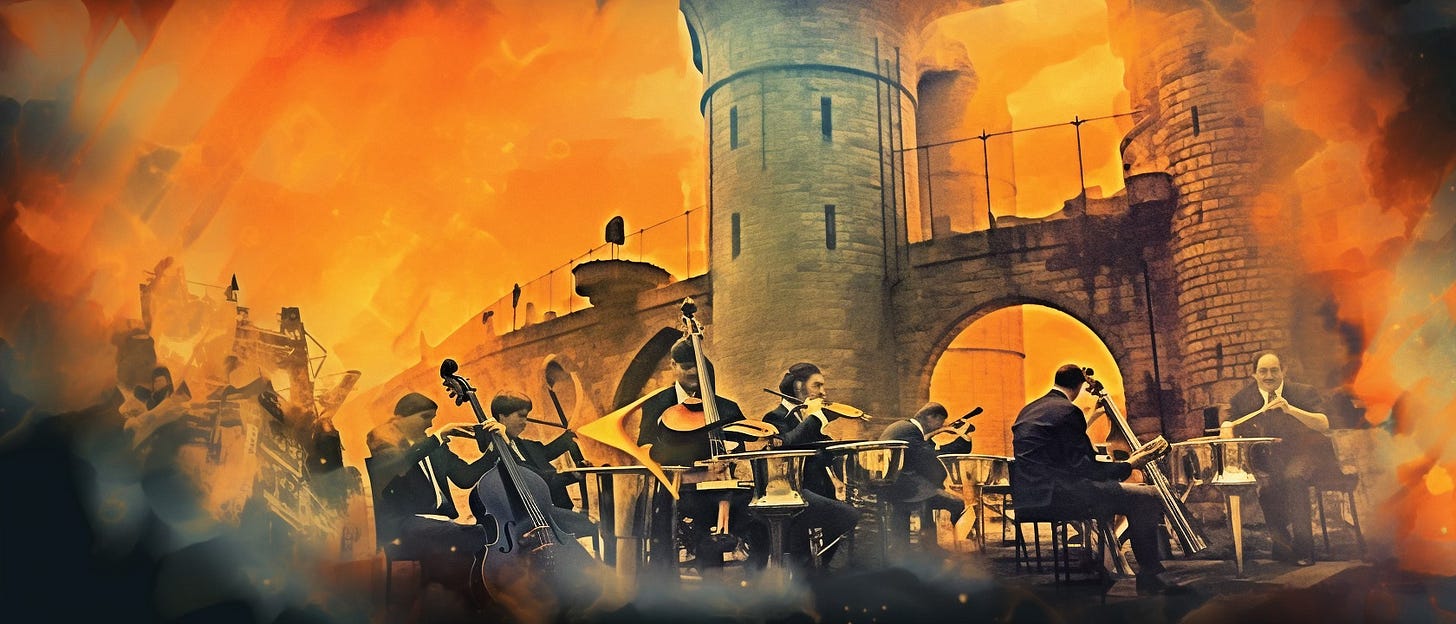I’m writing here to publish a few days behind schedule; as I’m just back (thanks to the goodness and generosity of several kind people) from an exquisite meditation retreat.
In the spirit of a casual jazz riff, I’ll here offer not so much a complete essay, but side dishes to flavor the emerging main course of what I hope to say over the next few weeks.
Ray Dalio, Zak Stein, and others offer us a big picture view of our time. “Context is King,” it has been said, and these perspectives serve distinctly to bring some breadth to hold our current evolutionary catastrophe, so traumatic up close and personal.
I have offered the point that humanity is globalizing in a way yet unseen in our currently circumscribed history. If we take on a developmental lens, in this case, and in particular — that offered by Terri O’Fallon and company through the Stages model — there is a strong suggestion that we are moving into a new time when, in contrast to the rugged individualism of conventional modernity, the foreground of our journey will be much more characterized by our collective and interdependent nature.
Zak asks us to consider a 500 year lens. Ray echoes that sentiment, but also introduces a perspective on 2500 years. Both are, I think, useful and admirable. Stepping back even further, from a 12,000 year view, we might see even more, both in terms of contextual advantage, but also in terms of a precision of insight.
In the oscillating polarity of individual and collective, we can see, when the light hits just right, that each of those dimensions represents and includes the other in subtle ways. When we move towards individualism, we join a broad cadre of individualists. When we tack collective, our group inevitably defines itself as a new order individual in contrast to whatever background falls into relief in its arising.
12,000 years ago, with the so-called “dawn of agriculture,” humanity began the shift into a new order of collective defined by the widespread propagation of an agricultural orientation that characterized itself largely by a somewhat separation from and dominance over nature. (Of course there is the legitimate point that humans were rather colonized by wheat and rice and other crops which used us as protective and propagation agents, but I digress…)
That move propagated a rapid expansion of population and the eventual teasing apart of large-scale cultures with significant globalizing impacts (the time between worlds — commonly considered the emergence of modernity — that Mr. Stein references from half a millennia ago. Mr. Dalio draws this further into relief over the past 2500 years of empires.)
Enshrined in this most recent entrepreneurial and industrial convention is the golden statue known as the pace of progress. Today we cling to this sacred icon with increasing tenacity; not in the least in hopes that our rapid technological advancement will save us from the accumulating externalities of this very practice which are otherwise currently poised to be our very downfall.
“If you wish to go fast, go alone. If you wish to go far, go together.” — Ghanaian proverb (possible origin.)
Drawing from observation of evolutionary patterns unfolding, we can see that we have indeed gone very fast over this recent window of time, but now at the edge of destruction of our world, we must go far.
Phrases like “rapid iteration,” “minimum viable product,” and other “quick to market” injunctions have emerged as the gospel of this late stage capitalism (the meanest paperclip maximizer ;-) and threaten to characterize our industrious and individualist response to current conditions.
Where the pace of progress sounds like a war drum, the Pace of Integration weaves more of a melody, a symphony that includes a new order of collective defined, not against nature, but with the planetary boundary of ecosphere bringing into relief our spacious grace of hurtling through this wide and wonderful mystery on spaceship Earth.
To make this transition, we must certainly lean on our industrious capacities, but they may not set the tone, nor define the direction of our actions. These capacities must be contextualized in a new order wholeness of a careful and sensitive reintegration with the ground of our being, this planet of which we are born, and all the (familial) relations which that entails, floral and fauna and wisdom within our great home.
In the spirit of integration, truly solving problems, rising to occasions, or otherwise wisely encountering our lives in an enduring way (whether alone, or together) requires what Tyson Y. refers to as "right story."
Wrong story is quick and easy and brings an egoic satisfaction. When we meet the world in that way; any difficulties, consequences or repercussions can be assigned outside of ourselves as perpetrator (“they,” conspiracies, the big bad brother other) set against we as righteous victim.
Right story requires seeing ourselves vitally in relationship and requires the real feedback loops inherent in healthy community engagement nested in ever widening spheres of relational and collective well-being.
There is a quote commonly, yet falsely, attributed to Einstein:
If I had an hour to solve a problem and my life depended on the solution, I would spend the first 55 minutes determining the proper question to ask, for once I know the proper question, I could solve the problem in less than five minutes.
The actual references…
1956 in a volume about agricultural education; the words were ascribed to an anonymous woodsman:
“A woodsman was once asked, “What would you do if you had just five minutes to chop down a tree?” He answered, “I would spend the first two and a half minutes sharpening my axe.” Let us take a few minutes to sharpen our perspective.”
1973 – “Often the problem as given is misleading, and you have to work through a mass of data to define the real problem. Often this step consumes more time than deriving the solution.”
Journal “Invention Intelligence”
1966 – “Some years ago the head of the Industrial Engineering Department of Yale University said, “If I had only one hour to solve a problem, I would spend up to two-thirds of that hour in attempting to define what the problem is.””
William H. Markle, “The Manufacturing Manager’s Skills”
Daniel Schmachtenberger wisely advises in this time,
“but the reason you're depressed, if you let yourself be…
— The reason that you might not be is because you won't let yourself be. —
Either you're actually an obligate sociopath that just can’t feel sh*t; or you won't let yourself be because it's overwhelming and you don't know what to do with that.
Trust that. Let yourself go there anyways, and then recognize that the reason you're depressed is not just what it means for you, but because…
… But because you love animals and the animals that are being destroyed are not that different than your dog; and because you love kids, not just your own, and the other kids that are being in totally f*cd situations and the future kids that won't have a chance at life are not that different than your kids.
And the reason for the depression at all is because life is actually beautiful and sacred, and the depression is recognizing the destruction of the sacred.
But then there's like okay well I'm here and I have some agency. I have some capacity. I can do something about it.
I don't know how to yet but I'm not going to let myself do anything other than figure out how and then act on that, and then when it's insufficient figure out how.
Richard Flyer offers an accessible and so valuable perspective in this regard…
Thank you for your patience with this riff, I look forward to sharing a more integrated picture to come…





